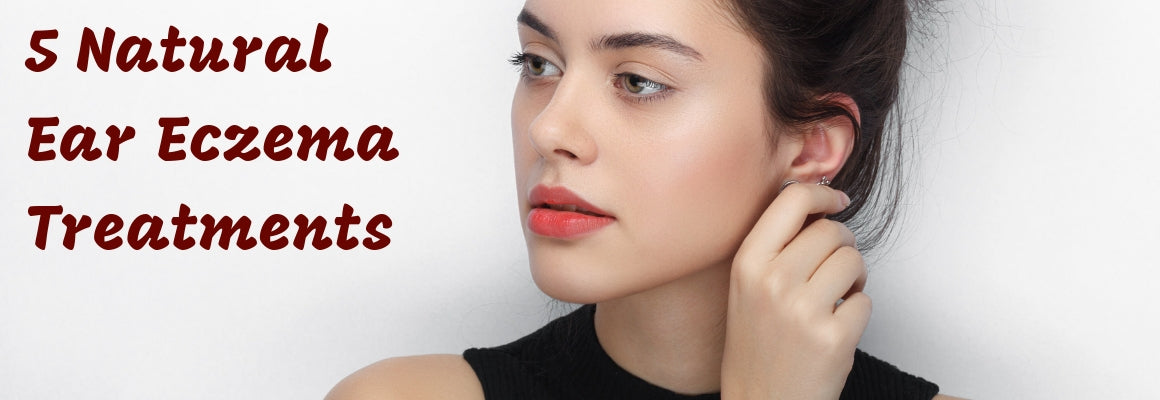Have you tried countless eczema treatments and haven’t seen results? Perhaps you’ve changed your skincare regimen or you’ve decided to try a new holistic treatment like acupressure or red light therapy, only to be disappointed by the results and a hefty bill. An Elimination diet for eczema may be just what you need to try next.
Many times moderate to severe eczema cases indicate something isn't quite right within the body. There can be any number of issues like improper liver function, leaky gut, etc. But one thing that is usually fairly easy to identify and is often a trigger for many, is food. Determining your food triggers via an eczema elimination diet is a great place to start when looking to heal your body internally.
You might be wondering why not just go in for some allergy testing to determine your food triggers? Is an elimination diet for eczema really necessary? Absolutely! Food allergy testing for skin conditions is historically not very reliable, as false positives or negatives can frequently occur. In addition, a full on food allergy may not actually be the problem, but perhaps it's a more mild food sensitivity that is triggering eczema. The only real way to 100% accurately prove a food allergy or sensitivity exists is through a food challenge, or as we like to call it – an eczema elimination diet. Even allergists consider this the gold standard in determining food issues.
What is an Eczema Elimination Diet?
Although elimination diets might get a bad rep for being difficult to manage, they are extremely helpful. Identifying food allergies or sensitivities can provide a sense of relief and help you heal your eczema once and for all. It’s really deciding to take action and carrying through your planning and preparation, which is the most difficult when doing an elimination diet for eczema.
An eczema elimination diet consists of removing certain foods (usually the top food allergens like dairy, egg, gluten, soy, tree nuts, peanuts, fish, shellfish, etc.) from your diet for a specific period of time (usually around a month). You then work to incorporate these foods back into your diet to determine which cause a reaction.
Keep in mind that an eczema elimination diet is not a long-term diet. The idea is to only reduce your intake of a triggering food if possible, but not eliminate that food all together.
How to Start an Elimination Diet for Eczema
Before trying anything, we recommend discussing your options with your physician, nutritionist or dietitian. An elimination diet for eczema should not be done alone, as your practitioner can ensure your or your child's diet is still well balanced, this especially critical for babies and growing children who may also need specialized eczema cream for babies. Never attempt a diet like this without supervised care. Discuss these steps with your practitioner:
- Embrace the decision 100%. Take a second to think about “why” you’re doing this and keep that with you either in the back of your mind, in a journal, or on a notepad next to your bed or stuck to the fridge. That way – when things get hard, you can think back to why you started the eczema elimination diet in the first place.
- Research and arm yourself with the proper resources. There are a variety of self-help books, as well as forums that can provide insight on how to get started and stick to an elimination diet for eczema.
- Educate those around you by providing resources or simple information on your eczema elimination diet. It’s always best to feel well supported, so that you can be most motivated to succeed. And this is especially helpful during family dinners and holiday parties.
- Learn and discover new recipes that don’t incorporate certain allergens. Find new food substitutes and stock up on them in advance. A great resource is RealPlans, an app that helps you plan out meals for an entire week while allowing you to filter out certain ingredients or allergens. It also provides a shopping list of ALL your recipes’ ingredients, so that you can make a one trip stop to the grocery store, saving you so much time.
- Determine which foods to remove and for how long together with your practitioner. Most the time the top most common food allergens are a good place to start. In general you can remove them for at least a month and some may find the foods need to be eliminated much longer, especially for adults who have had skin issues for long periods of time.
- Keep a journal nearby to track both your food and how you're feeling. This journal should be kept and used while eliminating foods, as well as for tracking reactions when re-introducing the foods. Journaling will take the guess work out of what might be triggering your eczema.
- Add the foods back in to your diet on a rotating basis and watch for reactions. Your practitioner will help you determine how best to add the foods back in after a month or so, but generally one food should be added back in over a four day period. Look for a reaction during that time period. If there is no reaction, wait a couple of days and then add another food back in over the same four day period. And continue this process. If you do find a food is triggering your eczema, speak with your practitioner about how to handle this food. If the food can be consumed once every four days without a moderate to severe reaction, it may be best to keep this food in your diet on a rotating diet in order to prevent the reaction from worsening or even developing into a full blown food allergy over time.
- Healing from within takes time, so in the meantime, continue treating your eczema externally with eczema cream to help relieve itching, dryness or redness. This Eczema Starter Bundle is a great option for trying various products. Not only does it come with some skincare products, but there is also a natural laundry ball and The Eczema Diet book (mentioned above) included.
For more tips beyond diet, check out How to Get Rid of Eczema Naturally.
Learn about an effective treatment that works great along side internal healing in this guide: How to Dry Wrap.
Resources
https://www.ncbi.nlm.nih.gov/books/NBK424896/



